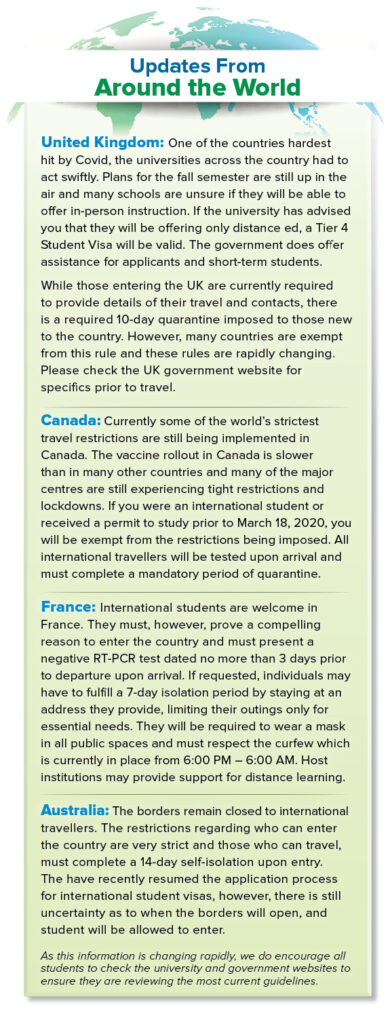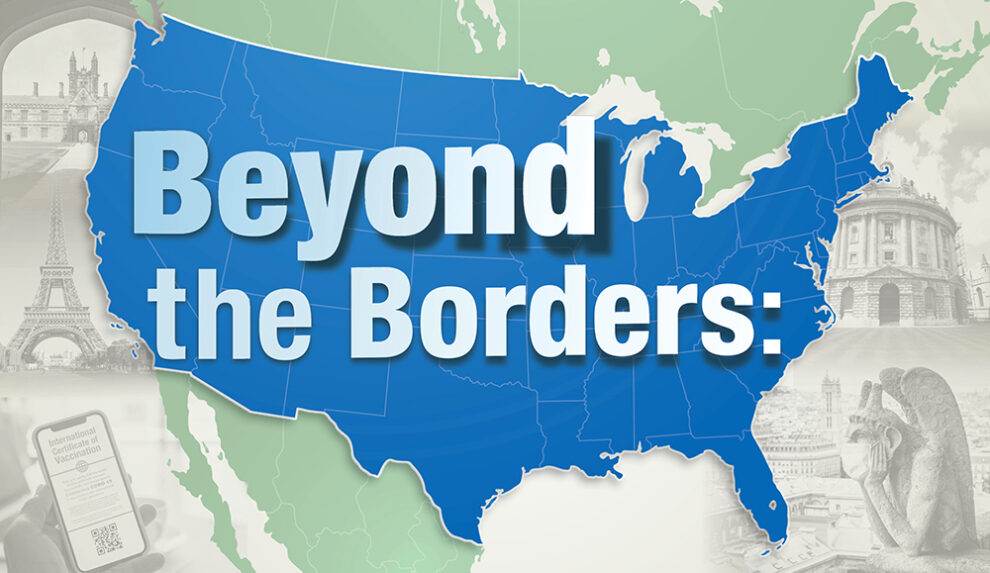Covid-19 has unleashed its fury around the world.We’ve all been exposed to unprecedented challenges measuring unlike anything we’ve experienced during our lifetime. Every industry has been impacted and every individual has fallen victim to the disruption in their lives.
Not immune to the effects of Covid-19, the typically resilient education sector has also been transformed, and continues to adapt on an ongoing basis. Add to this the closure and restrictions of travel and international border crossings and it’s a situation that seemingly most would prefer to avoid, rather than navigate. While most colleges and universities around the world have implemented protocol to limit the impact of the pandemic, the circumstances surrounding the requirements for international students still leave many uncertain of how to proceed.
To Apply or Not to Apply
International students have always been and will continue to be a strong focus for many universities; they will continue to accept international applications. But the variable that will continue to hinder the next steps remain in what countries will allow people to travel, and what countries will allow students from other countries to cross their borders and take up residency. As a result, many schools will accept applications and have contingency plans in place should student be denied entry or see their ability to travel, limited.
When the pandemic was declared global in March of 2020, students that were already enrolled and attending in-person classes abroad, suddenly saw their semesters cut short. Most schools were tasked with the enormous undertaking of repatriating international student quickly as the urgency to stop the spread of Covid-19 quickly intensified. In the cases where a student may have been in a final semester of final year, this meant extending their enrolment to allow them to complete their studies once the university was equipped to continue the education, virtually, hence affecting and possibly delaying, the future admissions of new international applicants.
The application process for the most part has understandably been completely transformed. The admissions interviews are taking place virtually as are many of the admission entry exams.
Enrolment
At this point, it’s quite likely that many students have applied and have been cleared for admissions beginning with the Fall 2021 semester. Now what?
International students have spent years working hard to gain admission to an elite school in hopes of studying abroad. It’s obvious that most will not quickly dismiss the opportunity, even in the midst of a global pandemic. The unfortunate reality, however, is that they may not have a choice.
Changing almost daily, the way countries are responding to the pandemic vary greatly. Much of a country’s restrictions are determined based on the availability of the vaccine and who has access to receiving it. In some instances, life is almost back to pre-pandemic normal; in others, lockdown measures and restrictions are still being implemented.
If a student is enrolled, it’s likely they are receiving updates and regular communication from the school. This information should provide them with clear direction as to what the next steps are for students scheduled to begin studies in the Fall of 2021. Remind students to stay on top of these changes, monitoring online calendars to learn about the guidelines for online learning at the start of a term that may transition to on-campus studies later in the year or early in 2022. There is likely to continue to be a constant shift by restricting or limiting access to lectures; class sizes may be reduced, or they may introduce a new hybrid model to better accommodate students through the recovery.
In countries where restrictions are quite strict and access to the border entry is limited, schools may offer students the option to temporarily delay their start date. Every school will have different rules and guidelines so investigating the options available will vary.
Documentation
Most international students will still require a student visa. This has become challenging, with many of the embassies and applications centres closed on a global level since the announcement of the pandemic by the WHO in March 2020.
It is strongly recommended that students apply as early as possible, and stay in close communication with the embassy of the country they are seeking to study in. While centers are now opening with the ease of restrictions and many countries have implemented changes to the deadlines to allow for quicker access to visas, many students are anticipating delays.

Accommodations
This could present some challenges for international students. While restrictions are easing around the world, it’s not uncommon to have to complete a mandatory quarantine when travelling.
If a student has arranged for on-campus or dormitory accommodations, they will have to plan to arrive in advance to meet the quarantine period. This will have to be arranged with the university in advance; most schools will keep in communication with the students directly. But depending on the country they are studying in, it is always suggested that the student proactively pursue the details to guarantee they are able to meet the schedule at the start of the term. If the new residence is a private property, it’s important to note that any quarantine imposed by the country must still be met.
Individual Decisions
Life following a global pandemic is nothing if not challenging. Covid-19 has wreaked havoc on the world, and how and when we will recover remains uncertain. The road to recovery is a mystery and it’s important that everyone explores all available information to make future decisions that are best suited for them.
For international students, there is a looming question about whether or not to pursue their dream of studying abroad. Should they forego that dream experiencing the uncertainty amid a pandemic? Or should they simply postpone or delay their studies?
There is no right or wrong decision. Studies have shown that while almost half of the students looking to study abroad have considered delaying their studies, approximately 5% have suggested they will cancel plans altogether. Students have to speak with their schools and get as much information as they can so that they can make a well-informed decision.
It is too soon to predict how the pandemic will affect the overall enrollment of students travelling abroad to pursue post-secondary education. In fact, it’s quite likely that 2021 may see a higher rate of students enrolled due to the delays that were imposed by students in 2020. The news of the rapid vaccine rollout and rate at which they are being administered around the world will certainly have an impact on the access to travel, countries and border access for international students and travellers in general.
By: Lindsay Taylor










